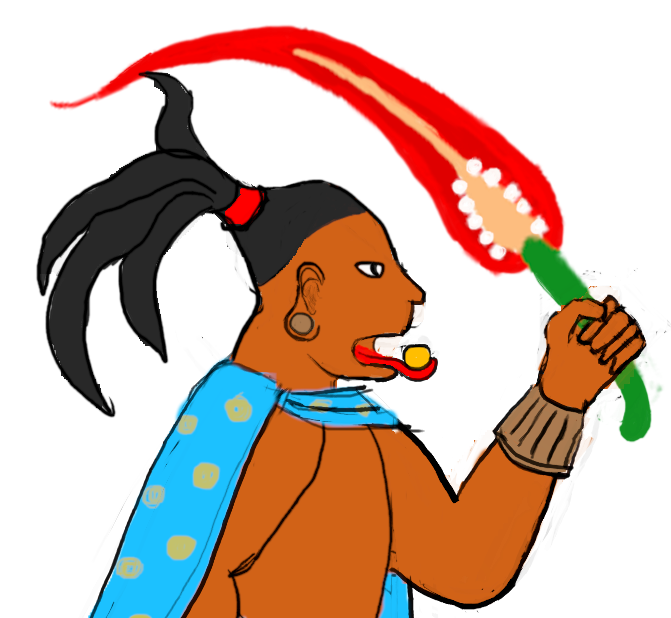Lüota (loo-OH-tah)
Lüota is the predominant language of the halflings of Eden. Brought here by said halflings during The First Age, it has been the third-most spoken language during most Interregnums since (behind only English and Moldése).
By all accounts, it is the primary Edenian language during The Wander Years—the periods when all sapient beings except the halflings are off trying to get reality right for the umpteenth time.
History & Defining Characteristics
Lüota originated during the Earth-665 iteration of reality, where the halflings were a migrant sea-faring people who shared the Pacific islands with other Austronesians of the time. As such, it shares much in common with languages such as Hawaiian. Lüota features entirely open syllables, a glottal stop, and more words for wayfinding than you can shake a stick at. There are separate verbs, for instance, for going east, going west, going north, and going south.
Phonology
Consonant Inventory
| Bilabial | Alveolar | Velar | Glottal | |
|---|---|---|---|---|
| Nasal | m | n | ||
| Stop | p, b | t, d | k, g | ʔ |
| Fricative | h | |||
| Trill | r | |||
| Approximant | w | |||
| Lateral approximant | l |
Vowel Inventory
| Front | Central | Back | |
|---|---|---|---|
| High | i | u | |
| High-mid | e | o | |
| Low-mid | ʌ | ||
| Low | a |
Syllable Structure
(C)V
Stress Pattern
In words with three or fewer syllables, stress falls on the penultimate (second-to-last) syllable. In words with four or more syllables, stress is not predictable. That said, if such a word can be divided evenly into three-syllable units, each unit is typically stressed as an amphibrach.
Spelling & Pronunciation
- ʔ is spelled ‘
- ʌ is spelled u
- u is spelled ü
Lüota has no dipthongs. Every vowel is pronounced as an individual syllable. For instance, “hoi” is pronounced hoh-ee.
Phonotactics
- Only single-consonant onsets are permitted.
- Codas and consonant clusters are prohibited.
- Every possible CV syllable occurs.
- Every possible V syllable occurs.
Grammar
Word Order
The main word order is verb–subject–object. Adjectives come after the noun, adpositions come before the noun (prepositions), and possessors come before possessees.
Nouns
There are five grammatical numbers in Lüota: singular, dual, plural, paucal, and collective. For example:
- ki: person
- a‘ki: two people
- o‘ki: people
- u‘ki: some people
- e‘ki: all people
Nouns also have 7 cases: ablative, accusative, allative, genitive, instrumental, locative, and nominative.
There are 3 grammatical genders: feminine, masculine, and neuter. Feminine nouns begin with the vowel ü and masculine nouns begin with the vowel i; all other nouns are considered neuter.
| Singular | Dual | Plural | Paucal | Collective | |
|---|---|---|---|---|---|
| Nominative | ki | a‘ki | o‘ki | u‘ki | e‘ki |
| Ablative | ki‘i | a‘ki‘i | o‘ki‘i | u‘ki‘i | e‘ki‘i |
| Accusative | ki‘e | a‘ki‘e | o‘ki‘e | u‘ki‘e | e‘ki‘e |
| Allative | ki‘a | a‘ki‘a | o‘ki‘a | u‘ki‘a | e‘ki‘a |
| Genitive | ki‘u | a‘ki‘u | o‘ki‘u | u‘ki‘u | e‘ki‘u |
| Instrumental | ki‘o | a‘ki‘o | o‘ki‘o | u‘ki‘o | e‘ki‘o |
| Locative | ki‘ü | a‘ki‘ü | o‘ki‘ü | u‘ki‘ü | e‘ki‘ü |
Verbs
Verbs in Lüota have a past, present, and future tense. For instance, here is how you would conjugate the verb bü (to walk):
| Past | Present | Future | |
|---|---|---|---|
| First Person | bümu | büta | büwi |
| Second Person | bütemu | büte | bütewi |
| Third Person | bütomu | büto | bütowi |
Numbers
Lüota has a base-10 number system.
- ha
- aha
- hüa
- kie
- tutu
- oho
- uti
- pipo
- ago
- luli
Derivational Morphology
- Adjective → adverb = add suffix -pe
- Adjective → noun (the quality of being X) = add suffix -pu
- Adjective → verb (to make something X) = add prefix pa-
- Noun → adjective = add suffix -po
- Noun to verb = add prefix du-
- Verb → adjective (result of doing X) = add suffix -e
- Verb → noun (the act of X) = add suffix -hu
- Verb → noun that verb produces (e.g. know → knowledge) = add suffix -ho
- Verb → noun used to accomplish X = add suffix -ku
- One who Xs (e.g. paint → painter) = add suffix -ki
- Place where the verb is enacted = add suffix -we
- Place where things are = add suffix -wa
- The stuff something is made of = add suffix -ba
- The smallest unit of X = add prefix hü-
- Diminutive = add suffix -hü
- Augmentative = add suffix -dü
- To form the ordinal number from the cardinal number, add suffix -po







awesome! this has an elegant phonemic inventory, and i love a dual. the cardinal system is really interesting. are gi/ka/mu/wi standard words for describing movement or are they used only to emphasize direction?
Thanks! My intent is that they're standard verbs for describing direction. Do you think that works? I'm imagining them at sea, shouting single-syllable directions.
that makes sense! i was just wondering if they would use those verbs more generally to create a sort of cardinal-based system like kuuk thaayorre or if those would be sea-faring-specific words, if that makes sense.